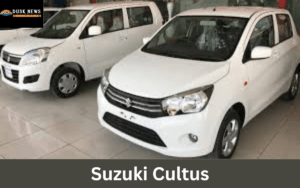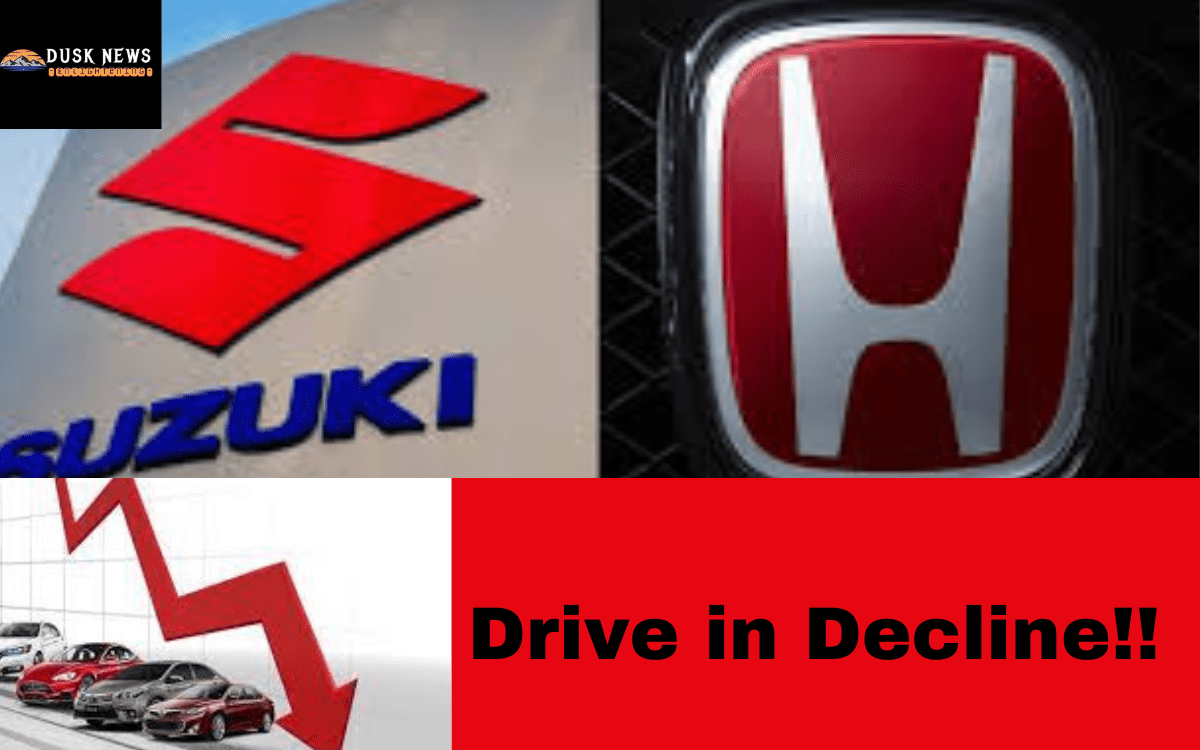|
Getting your Trinity Audio player ready...
|
Pakistan Auto industry: In a recent report by the Pakistan Automobile Manufacturing Association (PAMA), the country’s automotive sector faces a substantial downturn in car sales during the first four months of the current fiscal year, 2023–24. Shockingly, the data reveals a significant 47.4% decrease in sales compared to the corresponding period last year.https://www.brecorder.com/news/40252029
From July to October 2023–24, only 20,871 cars were sold, a sharp decline in Pakistan Auto Industry from the 39,700 units sold in the same months the previous year. This decline has triggered concerns within the industry, prompting a closer examination of individual car models and their sales performances.
Honda Civic and City: Pakistan Auto industry Witnessing a Drastic 65% Decrease
The stats of Major Player of Pakistan Auto industry , Honda Civic and City are particularly alarming, with sales plunging by 65%, dropping from 6,416 units in July–October 2022–23 to a mere 2,239 units during the same months this year.
Toyota Corolla and Yaris: Facing a 51% Dip
Another leading Brand of Pakistan Auto industry , Toyota Corolla and Yaris also witnessed a significant decline, experiencing a 51% decrease as sales dropped from 8,253 units to 4,032 units. The current slump contributes additional hurdles for Toyota within an industry that is already intensely competitive. This downturn compounds the obstacles that Toyota confronts in the fiercely competitive market.
Suzuki Swift, Cultus, and WagonR: Notable Double-Digit Decreases
The most affordable vehicle in Pakistan Auto indutry , Suzuki Swift, a popular choice among consumers, saw its sales decrease by 55%, falling from 3,466 units to 1,576 units. Furthermore, Suzuki Cultus sales dropped to 1,142 units from 2,952 units, marking a 61% decrease. The Suzuki WagonR experienced a notable decrease in sales, falling to 1,160 units from the previous figure of 2,181 units, marking a significant 47% decline.
Suzuki Alto and Bolan: Impacted by the Market Downturn
The Suzuki Alto, a key player in the small car segment, experienced a 30% decline in sales, dropping from 13,464 units to 9,362 units. Furthermore, the sales of the Suzuki Bolan reached a nadir, plummeting to 684 units, a stark decrease from the 1,469 units recorded during the corresponding period in the previous year.
Pakistan Auto industry Pakistan Auto industry challenges and Economic Factors
The significant drop in car sales is a source of concern for both car manufacturers and consumers alike. Industry experts attribute this decline to a variety of factors, encompassing economic challenges, escalating fuel prices, and ongoing global supply chain disruptions that have adversely affected the availability of specific vehicle components.
This decline prompts inquiries into the resilience of the automotive sector in light of economic uncertainties. It underscores the imperative for collaboration among industry stakeholders to devise strategic measures aimed at restoring consumer confidence and stimulating demand in the foreseeable future.
In navigating these challenging circumstances, collaboration is essential among stakeholders, encompassing manufacturers, dealerships, and policymakers. Together, they must formulate effective solutions and policies to breathe new life into the automotive sector, propelling it towards recovery.
Understanding the Dynamics of High Dollar Rate Impact
The correlation between the exchange rate and car prices cannot be overstated. The continuous depreciation of the Pakistani Rupee against the US Dollar has profound implications for the Pakistan auto industry. As the rupee weakens, the cost of importing crucial components and raw materials surges, directly influencing the overall production costs of vehicles.
This surge in production costs places manufacturers in a precarious position, forcing them to adjust the pricing of cars to offset the increased expenses. Consequently, consumers bear the brunt of this situation, facing elevated prices that make car ownership a more distant reality.
The Non-Localization Conundrum: A Dual Blow to Affordability & Pakistan Auto Industry
Impact on Major Players: Honda Civic and City
The predicament is further compounded by the persistent challenge of non-localization in car manufacturing. A substantial reliance on imported components and the absence of a robust local manufacturing ecosystem make the industry vulnerable to fluctuations in global economic conditions.
Honda Civic and City: A Drastic 65% Decrease in Sales
Among the major players in the Pakistani automotive landscape, Honda Civic and City stand out with a staggering 65% decrease in sales. The inability to localize production amplifies the impact, pushing prices higher and dampening consumer interest.
Struggle of Leading Brands: Toyota Corolla and Yaris
Toyota Corolla and Yaris, synonymous with the Pakistani automotive scene, face a formidable challenge. A 51% decrease in sales indicates the intensity of the struggle, emphasizing the urgency for a paradigm shift towards localization.
Toyota Corolla and Yaris: A 51% Dip Adds to the Competitive Pressure
The sales dip of 51% for Toyota Corolla and Yaris accentuates the competitive pressures within an industry already grappling with external challenges. The need for localized manufacturing becomes increasingly evident.
Notable Decreases in Affordable Models: Suzuki Swift, Cultus, and WagonR
The affordable segment, represented by Suzuki Swift, Cultus, and WagonR, witnesses notable double-digit decreases. This highlights the vulnerability of the more budget-friendly options in the market.
Suzuki Swift, Cultus, and WagonR: Double-Digit Decreases Compound Affordability Woes
Suzuki Swift experiences a 55% decrease, Cultus sees a 61% drop, and WagonR records a significant 47% decline. The non-localized nature of manufacturing accentuates the pricing challenges.
Impact on Small Car Segment: Suzuki Alto and Bolan
Even in the small car segment, which is often considered more accessible, the impact is pronounced. Suzuki Alto and Bolan grapple with the consequences of non-localization.
Suzuki Alto and Bolan: Market Downturn and the Struggle for Affordability
Suzuki Alto faces a 30% decline in sales, while Bolan reaches a nadir with a stark decrease to 684 units. The market downturn and affordability challenges persist in this crucial segment.
Root Causes: High Dollar Rate and Non-Localization
High Dollar Rate: A Squeeze on Affordability
The high-dollar rate emerges as a common thread running through the fabric of elevated car prices in Pakistan. As the currency weakens, the cost structure of the automotive industry is profoundly impacted, creating a ripple effect that reaches the pockets of consumers.
Non-Localization: The Achilles Heel of the Automotive Industry
Non-localization, or the lack of a self-sufficient manufacturing ecosystem, emerges as the Achilles heel of the automotive industry. The heavy reliance on imported components leaves the sector exposed to external economic factors, making it challenging to maintain stable prices.
The Consumer Conundrum: Balancing Affordability and Aspiration
The plight of the Pakistani consumer in this scenario is evident. Balancing the aspiration for car ownership with the harsh reality of exorbitant prices presents a conundrum. As the industry navigates these challenges, the need for strategic interventions and a shift towards localization becomes paramount.
Looking Ahead: A Call for Localization and Economic Stability
In charting the path forward, the emphasis must be on localization and measures that foster economic stability. Policymakers, manufacturers, and industry stakeholders need to collaborate to create an environment conducive to localized manufacturing, shielding the automotive sector from the volatility of global markets.
Conclusion: A Collective Endeavor for a Resilient Future
In conclusion, the challenges faced by the Pakistani automotive industry, especially the soaring prices of cars, are deeply rooted in the dynamics of a high-dollar rate and non-localization. The path to recovery necessitates a collective endeavor, with stakeholders aligning efforts towards creating a resilient, accessible, and vibrant automotive landscape for Pakistan.

